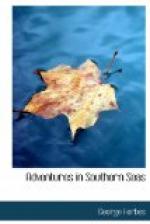“The Ruby Mountains. Among these mountains there are certain great and deep valleys to the bottom of which there is no access. These valleys are full of rubies. Wherefore the men who go in search of them take with them a piece of flesh as lean as they can get, and this they east into the bottom of the valley. Now there are a number of white eagles that haunt these mountains and feed upon the serpents in which the valley abounds. When the eagles see the meat thrown down, they pounce upon it, and carry it up to some rocky hill-top, where they begin to rend it. But there are men on the watch, and as soon as they see that the eagles have, settled they raise a loud shouting to drive them off. And when the eagles are thus scared away, the men recover the pieces of meat, and find them full of rubies, which have stuck to the meat down in the bottom of the valley. The abundance of rubies in these depths is astonishing, but none can get down, and if any could they would be devoured by the serpents which abound there. This country is inhabited by pygmies and giants. The giants, who are by far the largest men to be seen in this strait, are ruled by the pygmies.”
“And who is the author of this fairy tale?” I asked.
“One to whom I take my hat off,” answered Hartog. “Marco Polo, the first and greatest navigator in the world’s history. Where he could go we can follow.”
“And where does he place the Ruby Mountains?” I inquired.
“That is what troubles me,” replied Hartog. “Marco Polo knew the Great South Land, but not so thoroughly as we are beginning to know it now. From this chart I place the Ruby Mountains on the north-west coast of the continent of New Holland.”
“Whose chart is it?” I inquired.
“Marco Polo’s own,” said Hartog. “It was given to me by a man I once befriended, together with the parchment you have just read. How he came by it I need not say. The man is dead, and I trust his sins are forgiven him. But I know he would not lie to me, not willingly.”
“It seems a wild goose chase,” I said, although my doubts were rapidly dissolving under the witchery of Hartog’s sanguine temperament.
“So did our last voyage,” answered Hartog. “Yet every word that was written upon the paper that guided us was true. And why should we presume that men would give so much labour to preparing these charts and manuscripts in order to perpetuate lies?”
I could not but admit this. The ability to make these drawings, and to inscribe these manuscripts, I knew was confined to a very few, who were mostly men of truth and honour. Such accounts as were available of the wonderful voyages of Marco Polo I had read with avidity, and I saw no reason to doubt the assertions of this brave and learned man.
“What do you propose, then?” I asked Hartog, although in my own mind, I knew the old sea-dog was impatient to be off on a new treasure-hunt.




